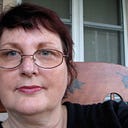Here's a different take, written from within an expanded version of "biblical" writing that includes certain symbolic elements of the Gnostic Gospels. It is unmetered narrative, "poetry" because the story is entirely symbolic.
Also written very much tongue-in-cheek, not intended as "reality" in any sense of the word, but rather as poetry. If one regards religious writing (from whatever religious POV) as poetry, one's whole perspective on it changes.
It doesn't have to represent a concrete reality of any sort, but rather, like other poetry, a rendition of possibilities that sparks the imagination to go in many different directions.
See, your version of "symbolic" truth still requires it to match up to physical, scientific reality. But that doesn't truly conform to the idea of "symbolic truth."
Symbolic truth is like the symbolism of dreams: it doesn't have to correspond directly to anything "out there," but rather, what is INSIDE the human mind as it experiences life. No physical reference to anything happening historically is required. It is about the development of the human mind.
Serpentine Meditations on Power/Knowledge
https://a-room-of-my-own.medium.com/serpentine-meditations-on-power-knowledge-bfd88d98572a
A deeper understanding of what I am saying requires a bit of knowledge of Foucault's concept of Power/Knowledge, tho it is not essential to grasp the greater part of it.
See also my prose poem:
My Creation Story: from Big Bang to Chaos Theory [a Flight of Fancy]*
Of course in this prose-poem I "make up" a lot of stuff, drawing a bit on some of what I know of science, but the science part of it isn't really relevant.
It's about the IMAGINED world that we experience. As I note above, there doesn't need to be any direct correspondence between the symbol and the scientific "fact."
Symbolic truth takes us through the world and the history of the "imaginary" -- an "imaginary" that leaves lots of room for all sorts of interpretations, including contradictory ones. Firm, provable truth is not required. What is required is, does it FEEL true? Is there something in it that broadens the mind? That gives one a sense of something beyond our personal physical existence or the existence of the world "out there."
Is it helpful for us to imagine it this way? Might it give us some understanding of living EXPERIENCED truths that defy scientific proof? Does thinking about life this way help to lead us toward better, more life-affirming directions? Does it allow room for differences without any form of condemnation of those differences?
It doesn't have to be consistent with a "provable" version of reality.
The poet/artist William Blake has been my inspiration since I first studied him as an undergraduate, and later for my Master's degree in English.
QUOTES:
“To see a World in a Grain of Sand, And a Heaven in a Wild Flower, Hold Infinity in the palm of your hand, And Eternity in an hour.”William Blake, Auguries of Innocence
“What is now proved was once only imagined.”William Blake, Auguries of Innocence
“If the doors of perception were cleansed every thing would appear to man as it is, Infinite. For man has closed himself up, till he sees all things thro’ narrow chinks of his cavern.”
William Blake, The Marriage of Heaven and Hell
“Without contraries is no progression. Attraction and repulsion, reason and energy, love and hate, are necessary to human existence.”
William Blake, The Marriage of Heaven and Hell
“The imagination is not a state: it is the human existence itself.”
And then there is Einstein's apocryphal advice to a mother who asked him what she could do to help her son become a scientist...
Read fairy tales.
Ok, yes, but what else?
Read MORE fairy tales.
There is evidence in a PTA newsletter that he did in fact say something like the above to a gathering of parents and teachers in New Mexico.
Me: I was born in Los Alamos, New Mexico, on the 3rd anniversary of the bombing of Nagasaki. My dad worked in the laboratories, and knew Edward Teller and Robert Oppenheimer. I heard this apocryphal story through my diad. My own origin story has shaped my life, my intellect, my writing, everything important that I believe.
My dad, as a physicist, loved fairy tales.
****
Sorry for the length here. I will be moving the greater part of this to its own article on my pages.
